It was one of those bluebird skiing days at Welch Village Ski and Snowboard Area.
The sky was perfectly clear. There was fresh snow on the ground. And Christina Baurichter was gearing up for a ski lesson with the Courage Kenny adaptive ski and snowboarding program.
Like everyone in the program, Baurichter is no ordinary student.
“I’m considered a quadriplegic,” she said.
Four years ago, a benign tumor on her spine completely changed her life.
“I know I don’t look like it four years later, but I was totally paralyzed when they took the tumor out,” she said.
Now, Baurichter can walk and do many things she used to do. But she still has weakness, balance and mobility issues on her right side, which makes her a candidate for the adaptive ski program.

The program is part of Allina Health’s Courage Kenny Rehabilitation Institute and has its roots at Welch Village. Since 1968, this ski resort in southeast Minnesota has been teaching downhill sports to students with a range of disabilities from blindness to cerebral palsy.
Today, Courage Kenny offers 1,200 lessons annually at six ski locations across Minnesota and Wisconsin. More than 400 skier volunteers teach lessons, and that includes Katie Querna who ran a similar program in Montana before moving to Minnesota.
“This was super meaningful for me,” she said.
For her, the skiing part is easy. It’s communication that’s a puzzle — especially when students are nonverbal.
“When people have had disabilities their whole life, they have a number of support people,” she said. She works with them to find new ways to communicate with her students. “Are there some non-verbal signs that I can use that are cues that indicate distress or pleasure or ease.”
A surrogacy and a benign tumor
Baurichter, 44, is relatively new to the Courage Kenny program.
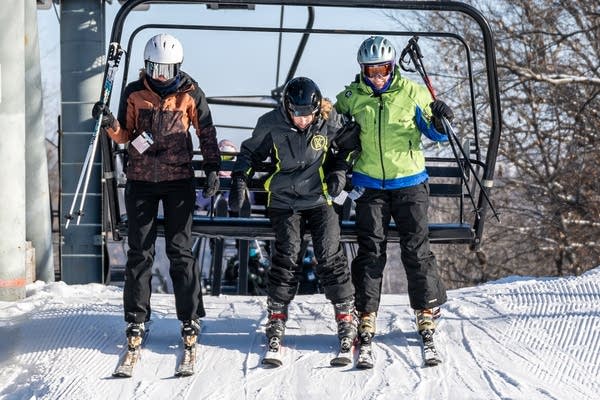
Baurichter is a mother of two. Several years ago she decided to help another couple become parents through surrogacy. In the summer of 2020, she started noticing weakness in her hands. She blamed hormones.
But the symptoms evolved into chronic neck pain and constant weakness in her arms. In 2021, doctors discovered a benign spinal tumor via MRI. In April, the baby was born early via c-section and Baurichter was whisked away to surgery to remove the tumor.
The surgery left Baurichter unable to move her legs or arms. Years of physical therapy have improved her mobility substantially since 2021.
An activity like skiing seemed out of the question to Baurichter just a few years ago. It’s a sport that requires balance and coordination, which she still struggles with. But these lessons have helped in her recovery, Baurichter said.
“You’re really using just leaning right, leaning and pushing on your skis,” she said. “It’s getting my body to kind of sense itself and what it needs to do.”
She said the lessons have also given her confidence that she’ll be able to take up running again. And she wants to be able to ski with her children, too.
Making friends through sports
It’s tiny victories like getting off a chairlift or making it to the bottom of the hill that make the Courage Kenny program so special, according to Paul Eckerline. He coordinates the program’s students and instructors at Welch.
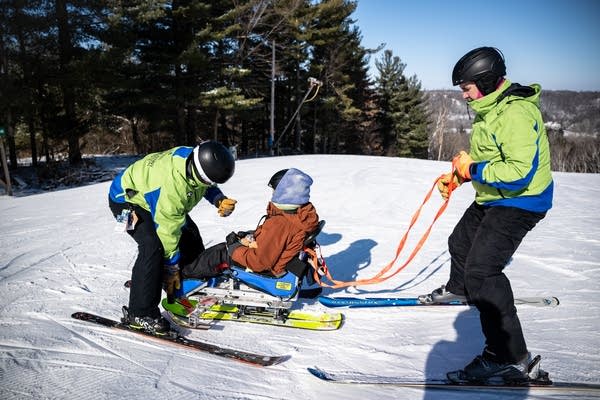
He said many of the participants are kids.
“They get a sense of accomplishment,” he said. “As one parent told me, ‘My kid might not be invited to a birthday party. Might not be invited to sleep over. If he makes a friend here, it’s perfect. If he learns to ski too, that’s okay.’”
Robyn Befort said her son, Lonzo, is one of those students. With his instructor, he rides a bi-ski, which is like a sled attached to short downhill skis.
“The faster, the better down the hill,” she said. “He is a daredevil.”
Lonzo, 22, has a rare chromosome disorder that results in epilepsy, blindness and deafness. But even though Lonzo is non-verbal, Befort said she knows he's having a great time by the sounds and gestures he makes as he’s coming down the hill.
The program has challenged Lonzo, but in a positive way, she said.
“The guys are really good with him. They know that when he’s kind of saying he wants to be done they kind of push him for another run. That’s a huge skill for him to learn some patience and not be in charge all the time,” she said.
At the top of her first run of the day, Christina Baurichter is practicing some patience with herself as she starts her descent.
“I don’t know why I’m so chicken,” she said, staring down the hill in front of her.
But slowly, and with a whole lot of concentration, Baurichter made a turn down the hill. And then another. And then another. Until she was at the bottom with zero falls.
“Yeah, let’s do that again,” Baurichter said, and she headed back toward the ski lift.
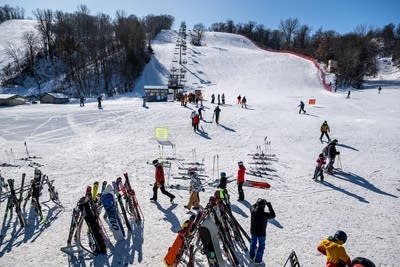
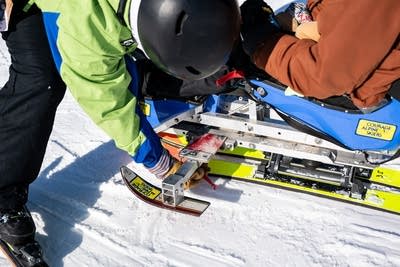
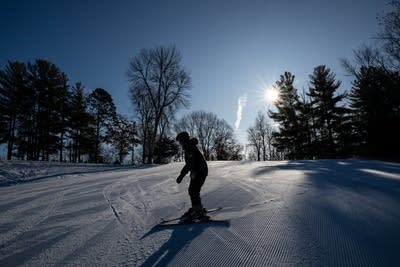
Collected from Minnesota Public Radio News. View original source here.
 Minnesota Public Radio (MPR) is a public radio network for the state of Minnesota. With its three services, News & Information, YourClassical MPR and The Current, MPR operates a 46-station regional radio network in the upper Midwest.
Last updated from
Minnesota Public Radio (MPR) is a public radio network for the state of Minnesota. With its three services, News & Information, YourClassical MPR and The Current, MPR operates a 46-station regional radio network in the upper Midwest.
Last updated from